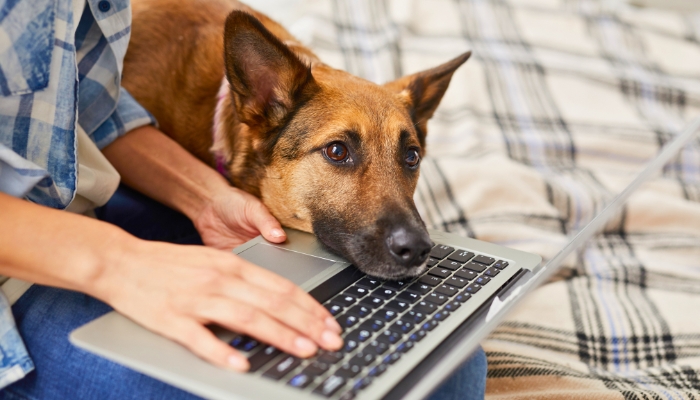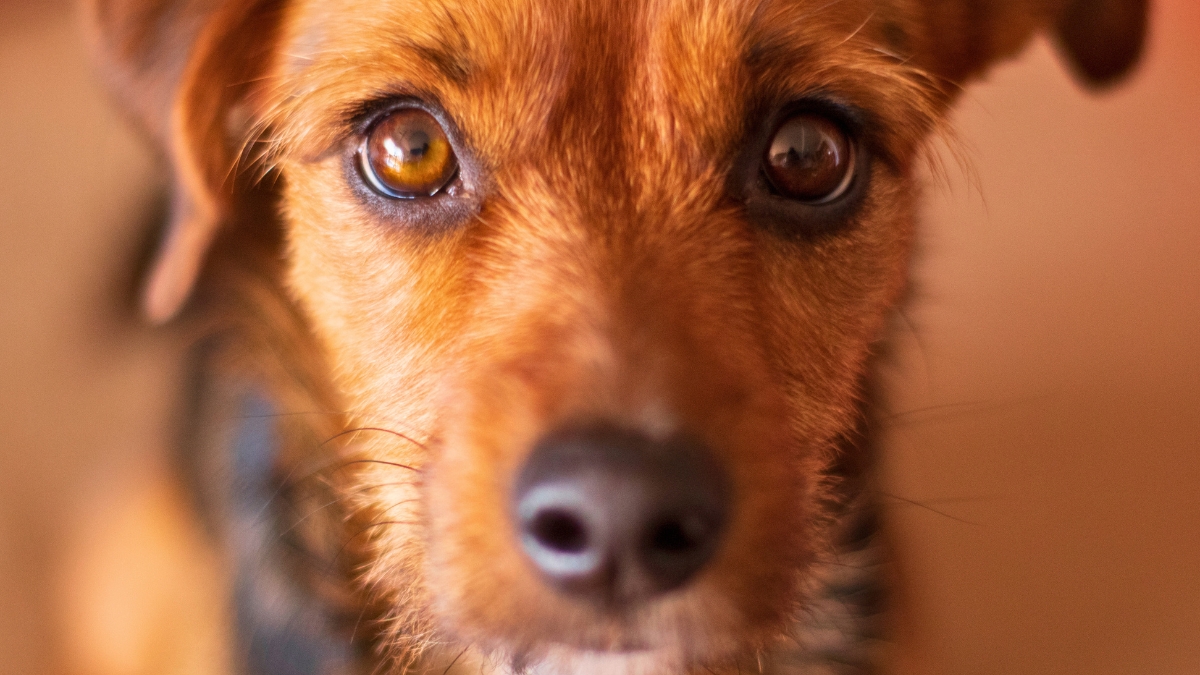Did you know your dog knows things about you that you can’t even imagine?
In this article, we’ll break down 12 things your dog knows about you.
You’ll find out what you can’t hide from them and see just how well they really know you.
1. Your dog knows when you’re sad
Ever felt lonely and down, and your dog came over and rested their head on your lap? Well, that’s no coincidence.
Dogs have an amazing ability to sense when we’re sad.
Research published in Animal Cognition shows that dogs can tell crying from other human sounds and are more likely to approach someone who is crying.
Their ability to detect our sadness is one of many reasons they’re considered some of the best emotional companions out there.
They aren’t trained to do this; they just feel it’s their time to be there for you.
And they don’t just comfort us when we’re sad—they also make us laugh and feel loved, even at our worst
That’s why it’s no surprise they’re called man’s best friend.
2. Your dog knows if you’re sick
Ever been sick and noticed your dog acting differently? Well, let me tell you, it’s not just your imagination.
Your dog might know something’s off with you even before you do.
Online, you’ll find touching stories of dogs who have saved their owners’ lives by detecting illnesses before they worsened.
This isn’t just based on stories, though—studies back it up.
For instance, a 2013 study showed how two dogs could identify 11 out of 12 narcolepsy patients in a group of 22 people just by the smell of their sweat.
Another study in 2019 found that dogs could correctly identify blood samples from people with cancer with 97% accuracy.
Fascinating, right?
3. Your dog knows if you’re scared
Dogs are incredibly sensitive to our emotions and can perfectly detect if we’re scared.
When we’re frightened, our bodies release a range of chemical signals that dogs can pick up, letting them know something’s wrong.
But their sensitivity to human fear goes beyond just sniffing out adrenaline.
Dogs can also detect subtle changes in our behavior and body language that signal fear.
Often, they might notice we’re tensing up or getting ready to flee, which makes them more alert and anxious.
So, when you’re scared, your dog might snuggle up to you or even protect you, as if they know you need their support.
After all, to a dog, their owner is part of their pack, and they’ll do whatever it takes to keep their pack safe and secure.
4. Your dog knows where you’ve been
Think you can hide where you’ve been from your dog? Think again.
Unlike humans, dogs can detect a wide range of different scents, including volatile organic compounds that cling to our clothes and skin.
In fact, dogs are so good at smelling that they can easily tell apart different places you’ve visited, like the grocery store, the office, or a friend’s house that has another dog.
Consider that a dog’s ability to detect scents is between 10,000 and 100,000 times greater than that of humans.
They can pick up countless nuances in smells, so you’re hardly going to be able to hide where you’ve been all day from them.
And while it might seem a bit intrusive, letting your dog smell your clothes and skin when you get home can actually help them get familiar with your scent and better understand your behavior.
5. Your dog knows when you’re coming home
Ever wondered how your dog always knows when you’re about to come home?
It’s not because they have psychic powers, though it might seem like it.
What’s really happening is that dogs are experts at recognizing patterns.
Your furry friend has learned to associate certain environmental cues with your arrival.
For example, it could be the sound of your car turning the corner or even the noise your building’s elevator makes.
Plus, if you commute by train, your dog associates specific times with regular events, like the bus that arrives five minutes before you do.
But there’s more: dogs can sense changes in the environment that we barely notice.
The scent of the air changes throughout the day, and thanks to their exceptional sense of smell, your dog can tell different times of the day apart.
This helps them anticipate when you’re likely to arrive home.
6. Your dog knows if you’re going on a trip
You’ve probably noticed how your dog seems sad when you’re about to leave for a trip, even before you start packing.
Dogs are incredibly sensitive to our routines and daily patterns, and they can pick up on subtle signals that something’s about to happen.
In fact, they can associate certain actions with specific events in their lives, like going for a walk at a different time or seeing you move things around the house.
When they see you packing your suitcase or even just shuffling clothes in the closet, they know you’ll soon be leaving home and will be gone for a few days.
And for a dog that loves its owner, that can be heartbreaking news.
That’s why it’s common for dogs to change their behavior when you’re getting ready for a trip.
7. Your dog knows when you’re mad
Ever noticed how your dog’s behavior changes when you get mad?
Believe it or not, your dog can totally tell when you’re angry.
The way you change your voice tone, your facial expressions, and even your body posture sends clear signals to your dog that something’s up.
Like, if you come home and find out your dog chewed something up and you get mad, they react to that emotion.
They might not get why you’re mad, whether it’s about the broken item or something else, but they definitely feel your anger.
That’s when you might see your dog with ears down, tail tucked, or even showing signs of submission.
8. Your dog knows when you’re not being fair
Did you know your dog can sense when you’re not treating them fairly?
Studies have shown that dogs are born with a natural sense of fairness.
In a study by the Veterinary University of Vienna, dogs participating in an experiment had to press a button to get a treat.
But here’s the twist: some dogs saw others getting better treats for the same action.
When they realized the distribution wasn’t fair, the dogs getting less just stopped participating.
This behavior shows that dogs not only notice inequality but feel demotivated when treated unfairly.
So, when you’re interacting with your dog, being fair and consistent is crucial.
This awareness will help you maintain a healthy, happy relationship based on mutual respect and fairness.
9. Your dog knows if you’re pregnant
Though there’s no conclusive scientific evidence to back this up, many women report that their dogs seemed to know they were expecting a baby even before they knew themselves.
The theory is that dogs can detect changes in a pregnant woman’s body odor, as well as in her behavior and mood.
Some dogs become more protective and affectionate, while others might show signs of anxiety or restlessness.
While this may be surprising, it’s not far-fetched when you consider a dog’s incredible sense of smell.
And if you’re pregnant and have a dog, it’s important to start preparing them early for the baby’s arrival.
Make sure to properly socialize them with children to teach them how to behave.
With the right training, your dog and your baby can have a happy and friendly relationship.
10. Your dog knows if someone is being rude to you
Your dog doesn’t just know you well; they also pay close attention to how other people interact with you.
In fact, they can identify if someone isn’t treating you right.
If someone’s being rude to you, your dog will probably notice right away.
This was shown in a recent study where dogs observed someone being rude to their owner and tended to evaluate that person negatively.
In other words, your dog can detect when someone’s treating you poorly and is ready to step up to protect you.
Next time you find yourself in a situation where someone’s being rude, watch how your dog reacts.
You’ll see they’re not comfortable either.
11. Your dog knows if you have low blood sugar
Yes, indeed. Some dogs, especially those trained to assist people with diabetes, can tell when their owner’s blood sugar levels are low.
Thanks to their ability to detect isoprene in the breath—a substance that increases during hypoglycemia—these dogs can alert their owners before a crisis occurs.
Training teaches them to react in ways you can’t ignore, like barking, jumping, or even waking you up if you’re asleep.
And while effectiveness varies, some studies show these dogs can be incredibly accurate.
Having such a dog not only provides greater safety but also improves your quality of life by giving you more confidence in managing diabetes.
12. Your dog knows your intentions
Your dog has an almost magical ability to anticipate what you’re going to do, sometimes even before you know yourself.
This incredible skill comes from being extremely observant of our body language and facial expressions.
Think about when you’re about to leave the house and, without saying a word, your dog is already waiting for you at the door.
Or those days you plan to give them a bath and they hide before you’ve even mentioned it.
Dogs pick up on subtle cues to understand your intentions, like the way you grab the leash or a change in your expression.
Studies have also shown that dogs can follow our gaze to locate objects, which helps them predict our actions.
This ability to try and understand humans not only shows their intelligence but also the deep bond they can form with us.

As you can see, your dog knows more about you than you might think. They are attentive observers, spending enough time by your side to truly understand you.
Whether it’s detecting your emotions, predicting your actions, or even sensing health issues, their ability to connect with us is extraordinary. This deep bond is what makes dogs such incredible companions.
So next time your dog reacts to something in a way that surprises you, remember—they probably know you better than you know yourself!
Bibliography:
- https://www.livescience.com/20823-canine-comfort-dogs-understand-emotion.html
- https://pubmed.ncbi.nlm.nih.gov/23835278/
- https://www.degruyter.com/document/doi/10.7556/jaoa.2019.077/html
- https://www.frontiersin.org/journals/veterinary-science/articles/10.3389/fvets.2018.00056/full
- https://www.science.org/content/article/dogs-have-nose-inequity
- https://flo.health/getting-pregnant/trying-to-conceive/signs-of-pregnancy/can-dogs-sense-pregnancy
- https://www.sciencedirect.com/science/article/abs/pii/S0149763416303578
- https://journals.plos.org/plosone/article?id=10.1371/journal.pone.0210092
- https://www.ncbi.nlm.nih.gov/pmc/articles/PMC5541559/
